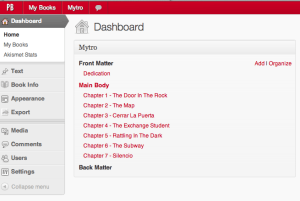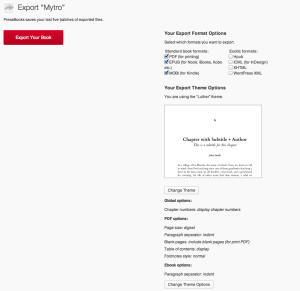As a middle-aged author of middling talent, I find myself often working on amazing book projects and finding no way to share them with the world. Formatting issues abound in many writing programs and it’s totes hard for me to grok the difference between PDFs, mobis, and ePubs. That’s why PressBooks is so important.
The program, created by publishing innovator Hugh McGuire, is a WordPress plugin that makes it easy to upload and publish a long-form piece of fiction or non-fiction. You create the front matter, add a cover page, and then flow in your chapters. Each chapter gets its own WordPress page complete with comments, and readers can download the entire book in almost any XML-compliant format.
“We’ve been relatively quiet on marketing, and have been focusing on trying to get something users love. We think we are there now, with a whole revamp of the code, and improvements now happening at a fast pace,” said McGuire. “In our free service, we’re seeing something like 100 print and ebook exports a day.”
The code, available here is GPL v2.0 licensed and works best with a clean WordPress Multisite install. The program creates a fairly unique system that is focused primarily on book creation. You can create multiple “books” (poemsofloveofbeefjerky.johnbiggsbooks.com, poemsofthatprettyladyonthebus.johnbiggsbooks.com) and edit them on the fly.
“So it is still early days, but it’s the long haul we are after. We’ve seen multiple competitors spend lots of money on marketing, see spikes in traffic, and then fade. We’ve focused not on user acquisition to date, but rather on making something a small number of users, including commercial publishers, as well as self-published authors, love.”
I tried the service and it works quite well. It creates a nicely laid-out, easy to maneuver online book and the export features work fine. It is, as McGuire writes, a content management system for books. The system now uses PrinceXML to turn the HTML into PDFs for output and you can export the entire book at any time. There are plans to add a print-on-demand service for customers as well.
In addition to the open source code, there is also a freemium website, Pressbooks.com, where authors can host their own books for free or pay for more features and customization.
“While there are other tools out there, focusing on ebooks or print, I don’t know of any other services that have taken such a broad view, of making a book content management system that will output,” he said.
McGuire hopes to be the Linux of e-publishing – mostly free – and the real money comes from installation and support.
“My very first conception of PressBooks was as an open source tool. As we started building I changed course, for a few reasons: unless I could see a clear business case to open source, I wasn’t ready to do it, we had a focus on trying to make a great tool — and before pressbooks was great, I wasn’t sure I wanted it out in the world as OSS.”
“What changed was coming to the realization that our existing business model wasn’t flying: we have a decent number of self-publishers using PressBooks, and a handful of commercial publishers using it — but you need huge volume to make the self-pub route work; and the vast majority of commercial publishers are just not ready to make the radical step towards something like PressBooks.”
The customer base, then, were “new publishing entities, without existing/legacy business models, who are looking at whole new ways to build publishing businesses.”
“It became clear that one big problem in the book industry right now is that the tools and workflows for making print and digital are so cumbersome, costly and time-consuming. It was obvious that the world needed a great, and easy to use, web-based book creation tool — one that could do print and ebooks (which every author and publisher needs right now), but that would be future-proofed by building books right into the fabric of the web from the start,” he said. “We want to be the best content management system for books.”


